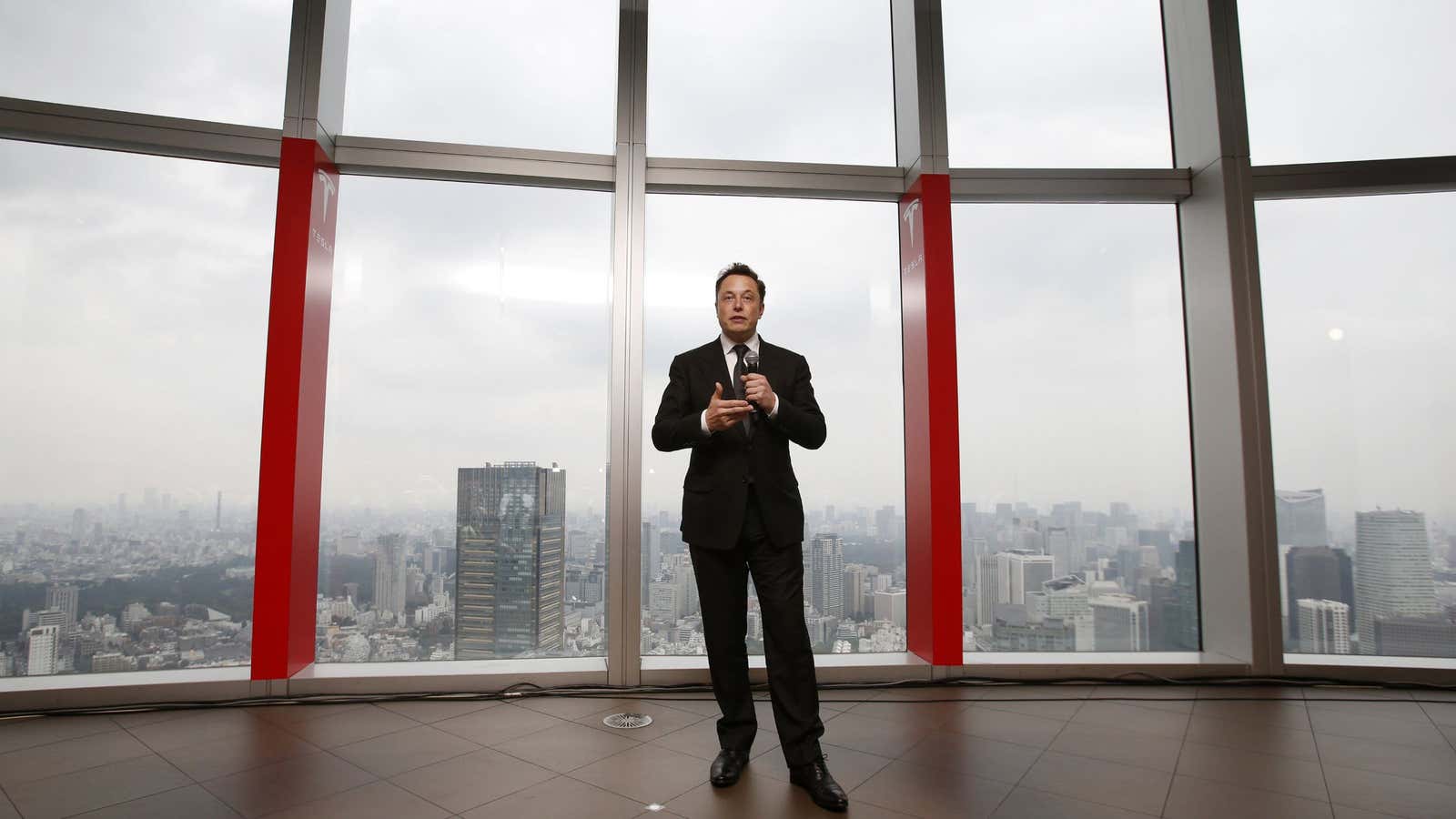Yesterday marked three years since the tragic passing of Apple’s visionary co-founder Steve Jobs. And it’s increasingly clear that his true successor as the world’s most important, and exciting, entrepreneur is not Mark Zuckerberg, Jack Dorsey or even Tim Cook. It’s Elon Musk.
If there were any doubts about that then they were dispelled last week. All it took was a cryptic tweet from the 43 year-old South African-born CEO of electric car maker Tesla to send the technology and business media into raptures.
Nobody knows for sure what “the D” is (let alone the “something else” Musk refers to), but theories abound. Among the most plausible of them is the idea that Tesla could be launching an all-wheel-drive and/or dual-motor version of its Model S sedan. The most ridiculous speculation is that the announcement could involve a Tesla delivery van or dune buggy. We will have to wait until Oct. 9 to find out for sure.
At any rate, if the ensuing frenzy of half-leaks and wild conjecture felt familiar, that might be because it’s exactly the strategy Apple, since the Jobs era, has used to promote its own new products. And with great effect, as the company continues to be wildly successful, with the most sought-after consumer devices in existence.
Fast Company succinctly explained Apple’s approach to building hype a couple of years ago:
Apple is a master of the teaser marketing campaign, dragging on the suspense for as long as possible. For weeks if not months before the release of every iPhone, the media conversation builds to deafening levels. Apple stokes the buzz by providing virtually no information…In essence, Apple created a cliffhanger as the media and bloggers speculated,”What could it be…?”
Musk’s tweet appears to have successfully created a groundswell of anticipation (and large amounts of free press). And the parallels don’t stop there.
Great products, beautifully designed
Although Tesla’s products lack the mainstream appeal of Apple’s, they inspire a similar, cult-like devotion among users. Maybe that’s because Musk is exhibiting a Steve Jobs-like obsession with the beauty and quality of them. Musk also appears to be subtly channelling the Apple founder in his mode of promotion.
Jobs famously said (paywall) that companies fall into decline once “the quality of the product becomes less important. The company starts valuing the great salesman, because they’re the ones who can move the needle on revenues.”
Yet Jobs, in his own way, was a truly great salesman. He has been described as the greatest marketer of his time. Just watch him introduce the original iPhone back in 2007, gush over its many revolutionary qualities, and gently mock the early smartphones it swiftly rendered obsolete:
Aesthetically, Musk’s introductions for his products are quite different. But as the following video of him introducing the beta version of the Model S shows, he exhibits an extraordinary level of confidence in his them. Like Jobs, he exudes an intimate familiarity that suggests he is heavily involved in their design and creation, as well as immense pride:
Jobs used to pen brazen letters to the public airing grievances about outdated practices (by the music industry or Adobe, the maker of Flash software) he felt were affecting the Apple user experience. Musk’s open letters about his vision for Tesla and critiques of the patent system bear some resemblance.
Customer focus
It is a popular myth that Jobs professed not to listen to Apple’s customers. Actually, he was just as obsessed with customer service as he was with every other aspect of the Apple user experience. He famously fielded basic customer queries and even once rang a customer directly to apologize for long delays on repairs to a computer.
Musk has far fewer customers to deal with than Jobs did—Tesla’s cars are still niche products—but he is exhibiting a similarly strong customer focus. This summer, when two “very satisfied” Tesla owners took out an ad in Palo Alto’s local newspaper to call for slight changes to the Model S, his response was prompt.
Steve Jobs helped found one truly great company, Apple, and another highly regarded one, Pixar. He was forced out as Apple CEO, only to return triumphantly and not just resurrect it, but turn it into the biggest corporate empire the world has ever seen, on the back of a string of truly iconic products. He helped changed the way humans communicate and consume media.
Musk’s business achievements are impressive: He founded and sold PayPal, a company that now looks destined to play a key role in the mobile payments battle; is the CEO of both Tesla and the orbital exploration company SpaceX; and is chairman of solar panel maker Solar City. Still, it remains to be seen whether he can ever scale the corporate heights Jobs did.
But his impact on the planet might end up being even more profound. He could help transform energy storage and commercialize space exploration. He talks, with a straight face, about colonizing Mars and saving the human race. If he achieves even half of that, he won’t just be the next Steve Jobs. He will be on his own level of greatness.
